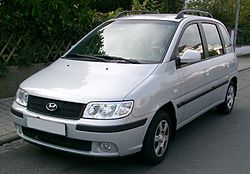| Hyundai Lavita (FC) | |
|---|---|
 Pre-facelift Hyundai Elantra LaVita (Australia) | |
| Overview | |
| Manufacturer | Hyundai |
| Also called | Hyundai Matrix (Europe, ASEAN and Israel) Hyundai Elantra LaVita (Australia) Inokom Matrix (Malaysia) |
| Production | 2001–2007 (South Korea) 2007–2010 (Turkey) |
| Assembly | Ulsan, South Korea [1] İzmit, Kocaeli Province, Turkey (Hyundai Assan) [2] Kulim, Malaysia (Inokom) Cairo, Egypt (Ghabbour Group) Athens, Greece (Hyundai Hellas AEBE) |
| Designer | Lorenzo Ramaciotti (Pininfarina) [3] |
| Body and chassis | |
| Class | Mini MPV |
| Body style | 5-door hatchback |
| Layout | Front-engine, front-wheel-drive |
| Related | Hyundai Elantra Hyundai Tucson Hyundai Tiburon Kia Spectra Kia Sportage |
| Powertrain | |
| Engine | Petrol engines : 1.5 L Alpha II I4 (South Korea) [4] 1.6 L Alpha II I4 1.8 L Beta II I4 Diesel engines : 1.5 L D CRDi I3 turbo-diesel 1.5 L U CRDi-VGT I4 turbo-diesel |
| Transmission | 5-speed manual 4-speed automatic |
| Dimensions | |
| Wheelbase | 2,600 mm (102.4 in) |
| Length | 4,035 mm (158.9 in) 4,050 mm (159.4 in) (first facelift) [5] 4,060 mm (159.8 in) (second facelift) [6] |
| Width | 1,740 mm (68.5 in) |
| Height | 1,625 mm (64.0 in) (without roof rack) 1,685 mm (66.3 in) |
| Curb weight | 1,223–1,316 kg (2,696.3–2,901.3 lb) |
| Chronology | |
| Successor | Hyundai ix20 Hyundai Stargazer |
The Hyundai Lavita is a multi purpose vehicle (MPV) produced by the South Korean manufacturer Hyundai, from 2001 to 2010. It was also marketed as the Hyundai Matrix in Europe and Southeast Asia, and as the Hyundai Elantra LaVita in Australia. It was mechanically related to the Hyundai Elantra (XD) and was designed by the Italian company Pininfarina.
Contents
Sales commenced in August 2001, and continued until the end of 2010, when it was replaced by the ix20.




